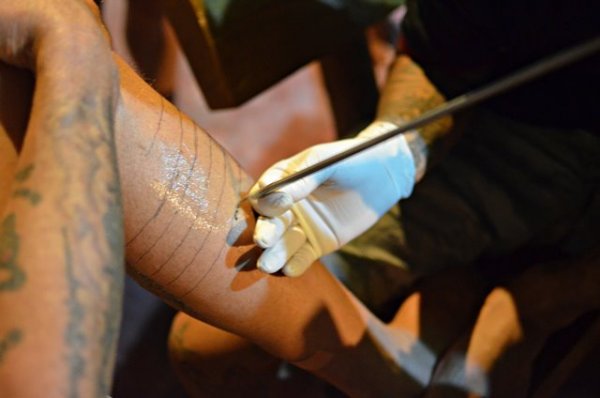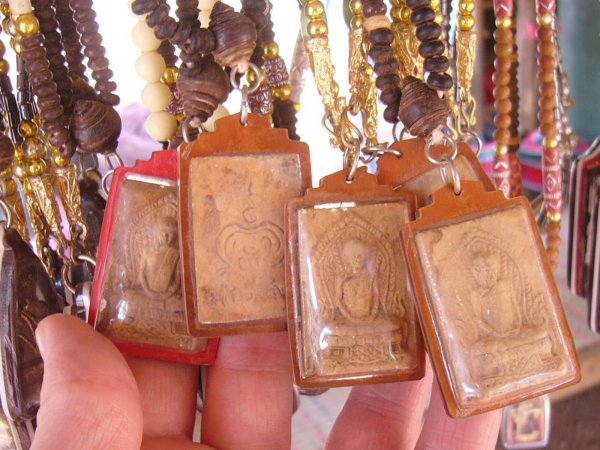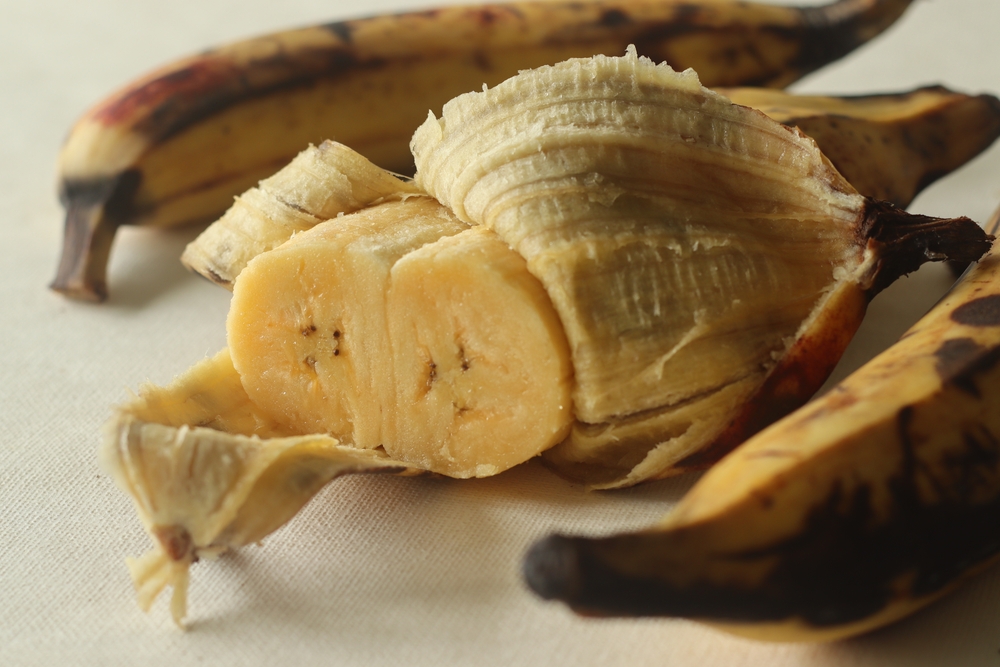Culture and Society: Superstitions and Folklore
General
Superstitious beliefs guide a typical Thai from birth to the grave, ordering daily life from what to wear and eat, to when and how to do things. The Thai lifestyle seems to be devotedly intertwined with beliefs and practices accumulated through time. Their superstitions mainly root from ancient animistic religions, spirit worship, and Buddhism.
Specific Superstitions
Amulets
Thai people widely use amulets called khawng-khlang, which literally means "sacred potent objects." Amulet-wearers usually seek protection from diseases, witchcraft, and accidents. Thais also wear amulets for luck, healing, good harvest, attractiveness, and so on, in a seemingly endless array of uses and potencies. For example, different kinds of amulets are intended to show gratitude to Buddha, to give the bearer desired traits such as persuasiveness, to combat diseases or malicious phi (spirits), or to attract members of the opposite sex.
Young Thais, especially boys, often wear these amulets. They feel that it is important for young men, especially those nearing adolescence, to wear these trinkets for strength and protection.
Traditional amulets are made of wood, ivory, resin, or metal, but modern manufacturers now produce plastic charms. Amulets can range from intricately sculpted pieces to chunks of wood or elephant tusk. The most popular amulets contain images of Buddha, famous monks, or of King Chulalongkorn, one of the most honored kings of Thailand, and they are often engraved with Sanskrit prayers.
One can purchase an amulet easily from local Thai markets or even through online websites. The more valuable ones are harder to find, though. Amulets can cost from a few hundred to a few million baht.
The manufacture of amulets is usually delegated to older Buddhist monks. In order to make a pressed or printed image, a monk needs a mold and a recipe of appropriate ingredients and procedures. Most importantly, he needs considerable knowledge of spells, sacred script, and magical drawings. One of the common and supposedly most potent ingredients is the ash of ancient handwritten sacred books of the monastery, much to the despair of historians.
Although amulets now have some association with Buddhism, their roots go deeper. Ancient Thais, known as wholehearted believers of spirits and animism, used amulets and talismans in pre-Buddhism eras. Remnants of ancestral worship are also still evident, as Thais often use fragments of bones from the remains of a relative or ashes of departed monks in their amulets.
Sacred Tattoos
There is no clear evidence to determine the exact origin of the practice of sacred tattooing, but the first documented cases are hundreds of years old. The tradition may have originated over 1,000 years ago during the era of the ancient Khmer before the Sukhothai Kingdom was established.
Thai sacred tattoos are closely linked with Buddhism, as high-ranking monks are among those who make them. In fact, the tattoo’s potency is supposed to depend on the spirituality and skill of the tattoo artist.
Some tattoo designs include poems, ancient symbols, and spells. Symbolism is very important. For example, some people have tattoos of dragons, as these dragons depict strength and wisdom. Wild boars are used to symbolize fierceness, a lion signifies dignity and strength, while geckos are symbols of love. A tiger on the chest protects the bearer from injury.
These days, people in Thailand get tattoos mostly for aesthetic reasons, but some Thais still firmly believe in the magic of the sacred tattoo. They believe that once the tattoo is applied, with the correct procedures and ceremonies, the spirit of the object or creature inhabits the tattoo. They believe that the images of the creatures come to life in times of need to protect and help them.
The tattoos are said to bestow two types of strength, kwam yu yong kong kraphan and metta mahaniyom. Kwam yu yong kong kraphan has the power to make the bearer invincible because the tattoos prevent the skin from being punctured by knives or bullets. Metta mahaniyom invites admiration and love, and generates positive influence over others.
Trees and Plants
Thais have a special veneration for plants and trees. The Thais’ reverence for nature and its creatures is deeply integrated into its customs, traditions, and even religion. Pure animism—the belief that all things, even nature, animals, and inanimate objects have a spirit—is still being practiced in the mountainous areas of the country, and animism is still one of the underlying principles of Buddhism or any other religion practiced by Thais.
According to one Thai superstition, when nature calls and there are no toilets nearby, you should avoid relieving yourself on the old, big trees. If there is no other alternative, you must apologize to the spirit of the tree and explain your situation. Banyan trees are especially prone to harboring spirits, so it is common to see incense and food offerings under banyans.
Other superstitions about trees arise from their names. Trees whose names are similar to the words that mean abandoned, forsaken, sorrow, heartbroken, or diminish might bring bad luck if you plant them in your yard. For the tree that sounds like "yearly," the superstition is that it will bring illness to your family every year. The tree that sounds like "to come in a crowd" might bring a crowd to attack or consume all your food. Similarly, lucky trees have names that sound like "love" or "popularity."
Other Superstitions
Actions
- Do not bend down and look between your legs or you will see a ghost.
- Sweeping dirt out of the front entrance and cleaning cobwebs from ceilings will cause you to lose money.
- Sweeping at night causes bad luck.
- Opening an umbrella indoors causes balding.
- Do not eat food that fell on the ground, because that belongs to the ghost already.
- Putting away valuable things at night invites the ghosts to take them away.
- Broken images of Buddha mean broken families.
- Don’t tell others about a bad dream while eating or it will come true.
- Rocking an empty cradle will bring sickness to the child.
- Throwing things on the roof causes bad luck.
- Entering the house through the window causes bad luck.
- Do not attend a cremation if you have a scratch or it will become infected.
Days
- On a Monday, you may cut cloth for dresses, sarongs, etc., but you may not cut wood.
- On a Tuesday, do not show off valuable belongings.
- Tuesdays and Saturdays are good days for washing or cutting one’s hair, but Mondays and Wednesdays are inauspicious.
- Wednesday is said to be an unlucky day to settle a conflict or to seek judgment from authorities. That is why the court calendar does not permit reservations for these days.
- Thursday is a bad day to venture into the forest.
- Friday is a good day to work on/in the field but a bad day to play or have fun with friends.
- On a Saturday, cloth should not be cut. Tailors and dressmakers are placed in a difficult situation because they are not allowed to work on Saturdays but customers demand to have their clothes ready on time.
Food
- If a woman eats a double banana, she will give birth to twins.
- If you eat before your elders, you will become a dog in the next life.
- Eating salt under a tree will cause the tree to die.
- Eating stolen food will make your throat swell.
- Eating leftovers from your child will make the kid naughty.
- Eating before a monk will make you a bad ghost in the afterlife.
- Eating corn when you have the flu will give you a high fever.
- Mixing cold rice with hot rice will cause you to lose your way easily.
- Eating chicken feet will make your handwriting bad.
- A woman who eats chili from a mortar bowl will have children with swollen lips.
- Eating turtles will make you a slow walker.
- If you eat dog meat, the spirit of the dog will possess you.
Copyright © 1993—2025 World Trade Press. All rights reserved.

 Thailand
Thailand 





